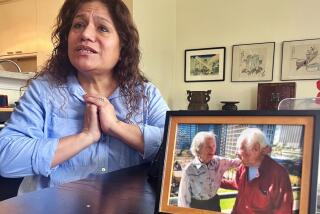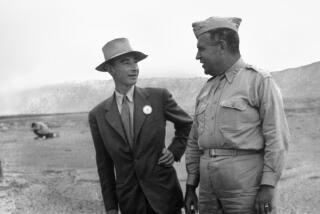Mark O’Brien; Writer, Poet Lived in Iron Lung
Mark O’Brien, whose career as a writer and poet despite life in an iron lung inspired an Academy Award-winning documentary film, has died at the age of 49.
O’Brien, tethered to the 650-pound breathing machine since he was paralyzed by polio at the age of 6, died Sunday in his Berkeley home, colleagues announced Tuesday. He ultimately succumbed to complications of bronchitis.
The documentary, “Breathing Lessons: The Life and Work of Mark O’Brien,” earned the Oscar for documentaries in 1997.
Three years before that, O’Brien and his dogged determination to remain independent despite his physical restrictions had been the subject of a cover article in The Times magazine and in several other national publications, including medical journals.
Encased from the neck down in the metal cylinder, O’Brien communicated by use of a 12-inch stick with a plastic bulb on one end that he seized between his teeth. With it, he could rotate a revolving table next to his head, and operate a radio, telephone and tape recorder by tapping on them. He could use the stick to turn pages of the books he read and to type on an old computer.
In 1990, he published a collection of his poems about his life in the iron lung, titled “Breathing.” The volume included pieces about his endless struggle to draw breath with the necessary assistance of the old-fashioned machine, such as: “All I get is a thin stream of it, A finger’s width of the rope that ties me to life, As I labor like a stevedore to keep the connection.”
He wrote articles, book reviews, essays and poems for Pacific News Service based in San Francisco. It was the organization’s executive editor, Sandy Close, who produced the documentary film on O’Brien, using money from a MacArthur Foundation grant.
O’Brien co-founded a Berkeley-based small press called the Lemonade Factory that specializes in publishing poetry by people with disabilities.
He was able to live in his own apartment with frequent part-time attendants who bathed and fed him.
“I decided I’d rather be dead than in an institution. There’s a doctors’ myth that disabled people need 24-hour care,” O’Brien told The Times in 1994, discussing a bout with pneumonia that once threatened to put him in a nursing home. “If you never, ever want anything to go wrong, I guess you could say that, but I’d rather take my chances.”
For a few years, O’Brien was able to take short outings to movies, restaurants or his beloved San Francisco Giants baseball games, using a more modern respirator. But as his lungs succumbed to post-polio syndrome, he became confined to the metal cylinder full time.
Before vaccines curtailed the dread disease, polio wreaked havoc in the United States, with 333,000 cases reported during the epidemic decade of 1946-56. O’Brien was one of the last struck down, in 1955, shortly after Dr. Jonas Salk developed the first poliomyelitis vaccine.
On a summer night before he was to start first grade in south Boston, O’Brien complained of a stomachache. A spinal tap identified polio, and within hours he was incarcerated in an iron lung. Only slightly more than 100 of the machines, which mimic the diaphragm after muscles controlling voluntary breathing are paralyzed, are still in use.
O’Brien was cared for and educated at home by his parents, Helen and Walter O’Brien, until his father waged a long effort to get him into a UC Berkeley residential program for physically disabled students. It was 1978, and O’Brien was 30 by the time he finally was admitted.
His iron lung was moved into a dormitory, and attendants pushed him to class in a reclining wheelchair. Stanford engineers gave him added independence and mobility with a customized electric gurney that he could control with pressure from his left foot and knee.
“I had to accept the idea I was in charge, which was very difficult for me in the beginning,” O’Brien told The Times in 1994. “I had to be my own social worker, dealing with four or five different agencies. I had to learn not to be intimidated by the bureaucracies and to insist, insist, insist and make myself a real pain in the ass.”
O’Brien graduated within five years with a bachelor’s degree in English and a 3.4 grade-point average. But when he entered graduate school, he was forced to drop out when post-polio syndrome put him back into the iron lung virtually full time.
His parents, a brother, of Sacramento, and a sister survive.
More to Read
Sign up for our Book Club newsletter
Get the latest news, events and more from the Los Angeles Times Book Club, and help us get L.A. reading and talking.
You may occasionally receive promotional content from the Los Angeles Times.








